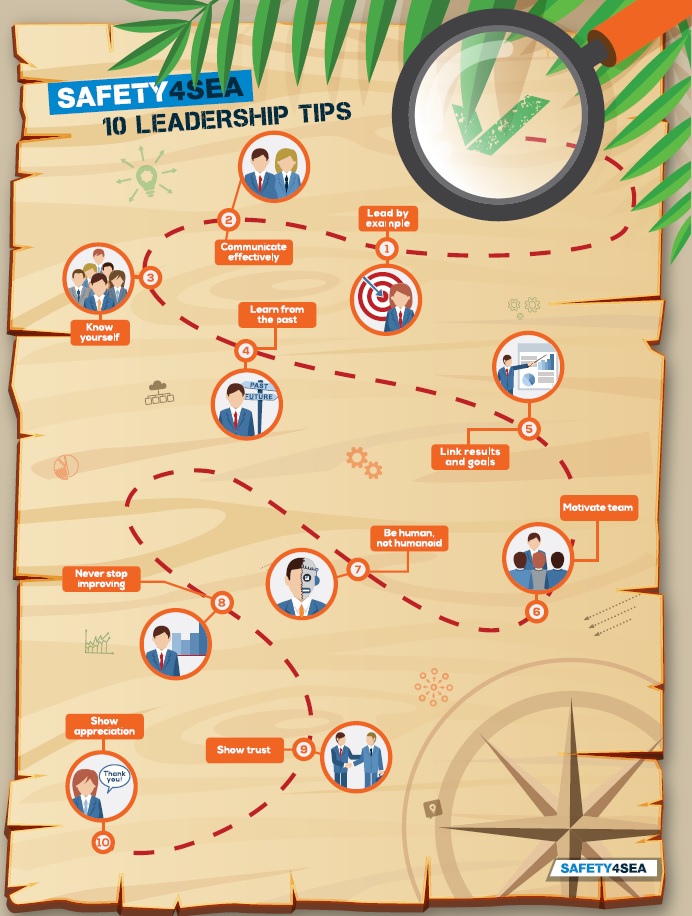Leadership is difficult to teach but it is the centerfold aspect in team dynamics while leaders need to develop themselves in order to successfully inspire and motivate team members towards improving overall team performance in all levels.
Here are ten powerfull tips for those who aim to improve their leadership skills in order to motivate and inspire successfully people onboard and ashore:
#1 Lead by example
Share your passion for your work; if you believe in the work, while recognizing possible hurdles, the team will do the same. Set your boundaries to show proper behavior and keep them clear to avoid confusion.
#2 Communicate effectively
Express your ideas clearly, making sure employees understand what you’re asking of them. Find an efficient method to communicate your thoughts. Create a conversation-friendly environment. Be patient and allocate sufficient time to people to express their opinions.
#3 Know yourself
Identify your strengths and weaknesses. Use feedback analysis; write down your expectations after making an important decision, set a timetable to review results and compare what actually happened with your initial expectations. Nurture self-awareness and develop leadership skills.
#4 Learn from the past
Be aware of previous failure cases and common mistakes. Focus on ‘easy cases’ as they can be tricky. Devote time to think how to improve previous pitfalls so as not to repeat them.
#5 Link results and goals
Set strategies and allow evaluation to measure performance. Set SMART goals, identify the milestones to achieve them and come up with a timeline for achieving each milestone. Make sure your team incentives match the goals you’re striving for.
#6 Motivate team
Involve your team in planning goals and regularly check in to find out the obstacles for not achieving their targets. Believe in people and empower them to bring news ideas to the table.
#7 Be human, not humanoid
When something goes wrong, use your compassion and empathy to help you understand the reasons. Don’t jump to conclusions or try to guess what happened, be hard on the results and soft on the person. Try to understand the problems from the person’s point of view.
#8 Never stop improving
Be sure to keep your mind open to new ideas and possibilities. Be curious; when leaders are curious they innovate. Know when to seek advice: nobody can know everything, finding someone you trust for advice when things get tough can make all of the difference.
#9 Show trust
Give your team members the correct tools and guidance to support them and believe that they will do a great job. Allow them to make mistakes; making mistakes is an inherent part of the creative process. Be as transparent as you can with all of your team members and communicate their progress.
#10 Show appreciation
Saying ‘thank you’ is by far the easiest way to do that. When team members do something extraordinary, acknowledge them publicly. Challenge them with meaningful responsibilities, proactively seek their guidance, mentor them, be there when they need you, allow them to challenge you.
Also view the following infographic (click on image for a larger view)































































thank you for giving the tips. I have already started using them. keep updating if with new tips.
Great list, showing appreciation and trust are probably 2 key tips here.
I find it helpful when you said that a team lead can improve their teammates’ performance at work by being patient and give them time to express their opinions. Aside from that, they can also offer a travel incentive through collaborating with a local service. Doing this will help keep them on the team longer and keep the company growing in the process.
If a leader takes the right measures at the right time, then his team can react responsively in every situation. Without knowing where to begin, a front-runner can never build a good line-up. A small undesired can ruin the entire productivity. Being a leader, you can’t let that things happen. Communicating the things properly will improve the overall performance. To improve performance, you must know how to enable others to do their job on their own.